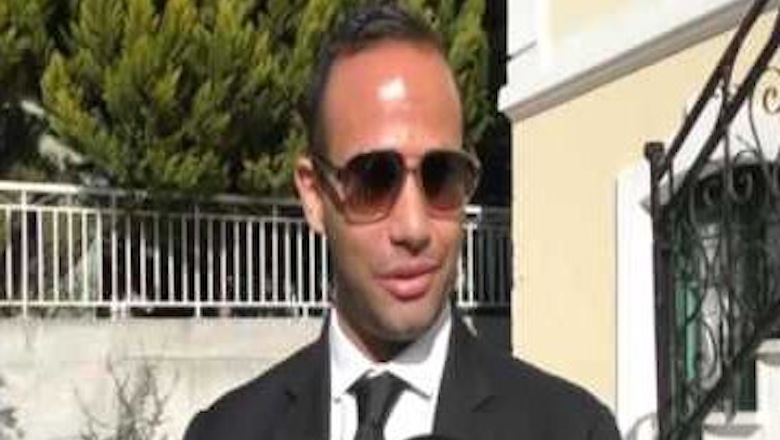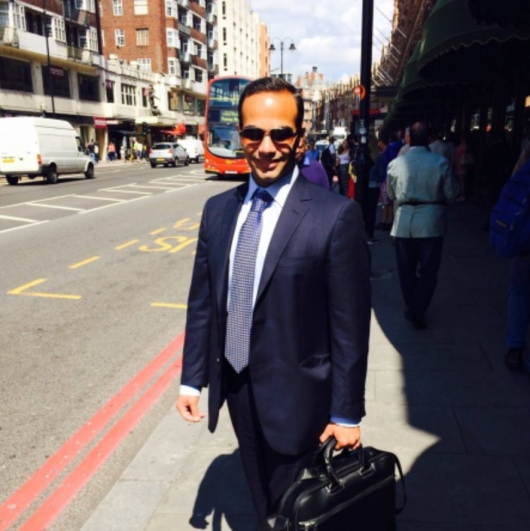
A foreign policy adviser to the Trump campaign has pleaded guilty to lying to the FBI during special counsel Robert Mueller’s investigation into Russian interference, Mueller’s office announced Monday.
George Papadopolous, of Chicago, Illinois, pleaded guilty on October 5, 2017, to making false statements to FBI agents. The case was unsealed on Monday. Papadopolous, 30, faces up to 5 years in prison when he is sentenced, but the plea agreement calls for him to get at most 6 months in prison, and possibly no time behind bars. A court hearing is set for January 22. You can read the court documents outlining the offense Papadopolous admitted to below:
Papadopolous worked for the Trump campaign starting in March 2016. Trump described him as a “an oil and gas consultant; excellent guy,” during a conference call with the Washington Post that same month. He can be seen in this photo with Trump and other advisers in March 2016, sitting two seats down on the left from now-Attorney General Jeff Sessions.
Papadopoulos was arrested on July 27, 2017, and “following his arrest,” has “met with the government on numerous occasions to provide information and answer questions.” The court documents remained sealed because prosecutors argued it would interfere with his ability to be a “proactive cooperator.” A former prosecutor told the Toronto Star’s Daniel Dale that could mean he was wearing a wire:
The court documents do not detail what information Papadopolous has given to investigators, outside of what is related directly to the crimes he is admitted to.
According to court documents, Papadopolous was first interviewed by the FBI on January 27, 2017, prior to Mueller’s involvement in the case, but during the agency’s investigation into the Russian government’s efforts to interfere in the 2016 presidential election. Papadopoulos admitted to lying about when he began working as a foreign policy adviser to the campaign. He also lied about his contacts with two foreign nationals, an “overseas professor” and “a certain female Russian national.”
“Through his false statements and omissions, defendant Papadopoulos impeded the FBI’s ongoing investigation into the existence of any links or coordination between individuals associated with the campaign and the Russian government’s efforts to interfere with the 2016 presidential election,” prosecutors said in court documents. The document was signed by Mueller and authored by prosecutors Jeannie Rhee, Andrew Goldstein and Aaron Zelinsky, all members of Mueller’s team.
Papadopoulos told the FBI that the professor, who has “substantial connections to Russian government officials,” told Papadopoulos the Russians had “dirt” on then-presidential candidate Hillary Clinton in the form of “thousands of emails.” Papadopoulos admitted that he lied during his interview he told FBI agents when he said that he learned that information from the professor prior to the campaign. “In truth and in fact, however,” Papadopoulos, “learned he would be an adviser to the campaign in early March and met the professor on or about March 14, 2016; the professor only took interest in (Papadopoulos) because of his status with the campaign.” He also admitted that the professor told him on or about April 26, 2016, about the “thousands of emails,” when Papadopoulos had been an adviser for more than a month.
Papadopoulos also told the agents that the professor was “a nothing,” and “just a guy talk(ing) up connections or something,” but he admitted the professor “had substantial connections to Russian government officials (and had met with some of these officials in Moscow immediately prior to telling (Papadopoulos) about the ‘thousands of emails) and over a period of months, (Papadopoulos) repeatedly sought to use the professor’s Russian connections in an effort to arrange a meeting between the campaign and Russian government officials.”
He also claimed he met a “certain Russian national” before joining the campaign and “their communication consisted of emails such as ‘How, how are you?’,” when “in truth and fact,” Papadopoulos “met the female Russian national on or about March 24, 2016, after he had become an adviser to the campaign.” Papadopoulos also admitted “he believed that she had connections to Russian government officials; and he sought to use her Russian connections over a period of months in an effort to arrange a meeting between the campaign and Russian officials.”

LinkedInGeorge Papadopoulos.
The guilty plea and court documents were unsealed on the same day that former Trump campaign chairman Paul Manafort and his longtime associate, Rick Gates, were indicted on 12 counts related to their ties to the former president and ruling party of Ukraine. Those charges are not related to the Trump campaign, but some of the allegations made against Manfort and Gates occurred while they were working for Trump. The two men are charged with conspiracy against the United States, conspiracy to launder money, unregistered agent of a foreign principal, false and misleading FARA statements, false statements, and seven counts of failure to file reports of foreign bank and financial accounts.
The indictment alleges that the two men “acted as unregistered agents of the government of Ukraine, the Party of Regions (a Ukrainian political party whose leader was Victor Yanukovych was president from 2010 to 2014), Yanukovych and the Opposition Bloc (a successor to the Party of Regions that formed in 2014 when Yanukovych fled to Russia.” According to the indictment, “Manafort and Gates generated tens of millions of dollars in income as a result of their Ukraine work. In order to hide Ukraine payments from United States authorities, from approximately 2006 through at least 2016, Manafort and Gates laundered the money through scores of United States and foreign companies, partnerships and bank accounts.
There is not an apparent connection between the charges against Manafort and Gates and the case against Papadopoulos. You can read more about George Papadopoulos at the link below:
